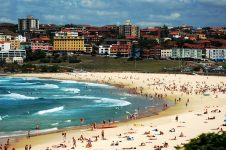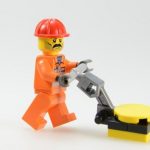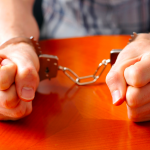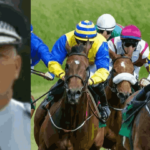‘Not White, Not Right’ – Racist Graffiti Scrawled Across Iconic Bondi

The eastern Sydney suburb of Bondi is a tourist Mecca, attracting millions of visitors from all over Australia and abroad each year.
The area showcases the best of our nation – a world famous beach with glowing white sand, a range of food outlets and top restaurants, retail stores selling everything from Australiana to Tibetan tapestries, and a vibrant weekly market.
However, racism reared its ugly head when police were called to Campbell Parade this morning to find around 15 swastikas and racist graffiti plastered on benches, police, electrical boxes, a footpath and bus shelter across the suburb. The graffiti included the phrase, “Not White, Not Right”.
Eastern Suburbs Local Area Commander Jason Box made a statement saying:
“The NSW Police Force takes crimes that are motivated by hatred or prejudice very seriously and any such crimes will not be tolerated”.
“If you are a witness or victim, and you experience any incidents such as this, we encourage you to report to police as soon as possible”.
He has appealed to the public for information on the offenders.
Graffiti Offences in NSW
Graffiti is the act of marking any space with a marker, spray paint or any other substance which cannot be easily removed with water or detergent.
It is legal if done with the permission of the owner, or if the area is a legal graffiti space.
What are the main graffiti offences?
Graffiti offences fall under the Graffiti Control Act or Summary Offences Act.
Specific graffiti-related offences under the Graffiti Control Act include:
- Defacing or damaging property by using a graffiti implement.
- Possession of a graffiti implement.
- Posting bills in a public place or marking any building or premises with chalk or paint without the permission of the owner.
It is also an offence to sell or supply spray paint cans to anyone under the age of 18.
What are the penalties for graffiti offences?
The most common penalty under the Graffiti Control Act is a fine.
The maximum fine for marking property is $440, unless there are aggravating circumstances, in which case the maximum fine increases to $2,200.
The maximum fine for possession of a graffiti implement is $1,100, or $440 for posting bills.
There is also a maximum penalty of 12 months’ imprisonment if it’s not your first offence.
Other possible penalties include a section 10 dismissal or conditional release order (guilty but no criminal conviction), a community service order or a good behaviour bond.
The court can also make a driver licence order, where they take points from your driving licence or extend your learner or provisional licence period.
If you are found in possession of spray cans or other implements, and police have reason to believe that you are planning to use them for graffiti-related purposes, they can confiscate the items.
What is a community clean-up order?
In some cases, the court may impose a clean-up order as an alternative to a fine.
This means you will have the option of performing community service work removing graffiti to pay off your fine.
The number of hours you will be required to work will depend on the amount of your fine.
Community clean-up orders can be made as an alternative to full payment of a fine or part payment, but if the fine has been paid in full, you cannot be subject to a community clean-up order.
To be eligible for a community clean-up order, you will need to be considered ‘suitable’, there needs to be work available in your local community, and you need to be willing to take part in the work.
You may also be required to participate in a two-hour graffiti prevention program as one of the conditions.






